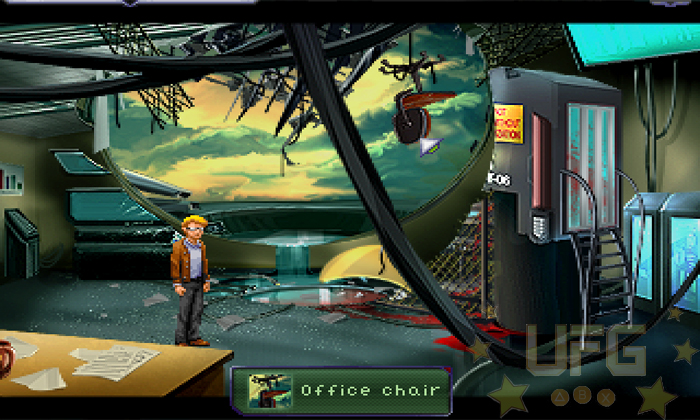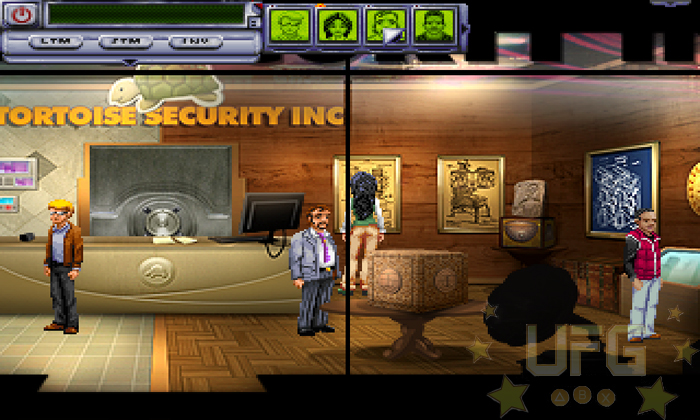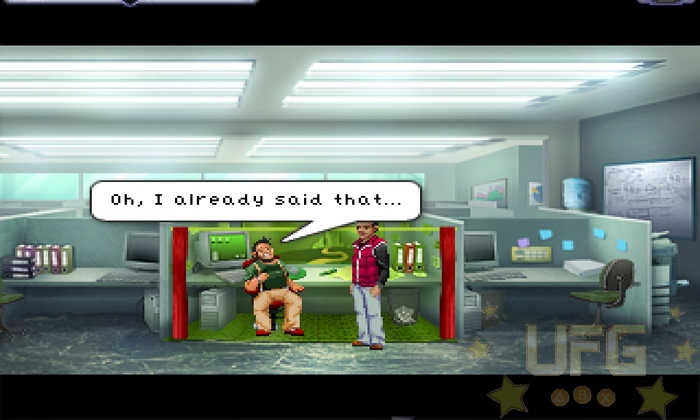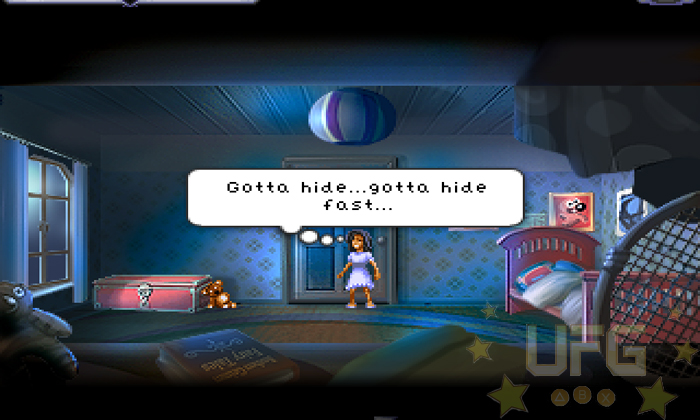Resonance
As I continue to ride the “indie” wave of innovation, I start to wonder why I keep spending $60 on big budget titles. I’d be lying if I said I didn’t like those games; there will always be room for certain AAA titles and/or franchises in my game library. It does mean, however, that smaller games are really starting to compete for my limited gaming time and money…and they’re winning!
Currently occupying my valuable game time is Resonance, an adventure game developed by xii games. It depicts the story of four individuals whose lives get turned upside down after a famous scientist is murdered. What starts out as a simple “who did it” mystery, evolves into a social commentary of what the future “could” bring. Players will have to contend with their inner demons, track down a killer, deal with secret organizations and more! The story, while not the most original tale, is well written. There is even a twist that I didn’t see coming, a rarity when it comes to video games. I don’t want to give anything away; I’ll just say that anyone who is able to complete the game is in for a treat.
With Adventure titles, the story is always the main focus; the gameplay is usually secondary. However, if the gameplay is severely lacking in the fun department, most people won’t finish the story. Thankfully, Resonance doesn’t fall victim to the problems, such as these, that plague the adventure game genre. There are no random think-outside-of-the-box puzzles, important items aren’t camouflaged to the point of needing a magnifying glass, and you won’t be subjected to large amounts of written information. The puzzles are all based on logic, meaning they all are grounded in reality. You won’t have to use an item in a weird way to solve the puzzles. When it comes to collecting information, there is a handy long term/short term memory system.
Characters can take anything in the game (that you can click on of course) and store a copy of it in their short term memory box, even if it isn’t needed. Just like the long term memory bank, they then can pull these thoughts to be used in conversations. For instance, clicking on a painting will cause the character you’re controlling to acknowledge its existence, while right clicking on it will cause them to examine it. You might not get anything out of clicking on it alone, but you can copy it into your memory. Now, talking to an NPC (or one of the characters in your party) about the painting may bring up a new clue…or not. It all depends on the circumstance and who is doing the talking. All of the important events are stored in a long term memory bank, housing all of the characters memories, which can be accessed at any time to help move the story along. For instance, one problem I had was proving that I was innocent of a particular crime. Going into my long term memory bank, I was able to pull up an event that showed my whereabouts during the time crime. By placing this memory into the dialog box, it gave me the option of bringing it up in the conversation, proving my innocence. It’s really an awesome way of collecting notes…without actually having to collect anything!
It’s great that Resonance doesn’t have the same problems as other adventure titles. With that said, it did manage to create some of its own. The main issue has to do with the short term memory bank. Early in the game this mechanic wasn’t an issue as I was solving puzzles left and right. I wasn’t breezing through them mind you; I was just able to use the clues given to logically solve puzzles. I was starting to enjoy the fruits of my logical labor; overcoming difficult puzzles and advancing the story. That progression came to a complete halt about a third of the way through the game. After a certain event, the entire main cast becomes controllable; you can switch between the four of them at any time. The next large story advancing puzzle required the completion of a bunch of mini-puzzles. This is where the problem came in. A lot of the puzzles required a particular person to do a particular action with a particular…well you get the point. Unfortunately, getting the right person to do the right thing meant that you had to have the right thought in your short term memory box. There are so many things you can put into that inventory that the possibilities seem overwhelming. What’s worse is that logical thoughts may not work if the wrong person is bringing it to the conversation.
Confused yet? Let me give an example. There is a part in the story that involves getting information from a hacker. In order to do so, you have to give them their “prescribed” medication. So logically, I picked the character that was a doctor and went to the hospital. There is a dispenser there packed with assorted pills that is only accessible by the hospital staff. I thought I’d be in and out, not true. Going to the machine didn’t work because I needed to plug in a patient’s medical info that used the same medication as the hacker. I couldn’t ask the nurse and the game wouldn’t let me take any of the medical charts off the wall. I tried putting the machine into the short term memory and then talking to someone. That didn’t work either. Slowly, my experience turned from having a good time to being really frustrated. And this was just one of the mini-puzzles needed to advance the plot!
After a few hours, I figured out what I was supposed to do. The answer was staring at me the whole time; I won’t giveaway how I got the medication (although I feel that I should). The frustration stemmed from there being so many “logical” things to add to your short term memory box. Not only that, but heavy use of this system keeps you from solving simple problems the old fashion way. If it was a normal adventure title, I would have kept clicking around till I found the solution. But, because of the memory/conversation system, if I didn’t get what I needed from talking about and/or picking up an item then I didn’t think said item was important. And who could blame me; that’s how I solved all the other puzzles up to that point.
What makes things worse is that the characters know what they are supposed to do already. Resonance has a cool hint system where the characters will talk to one another about what they should do. So why do I have to place a memory in a conversation box to get the other characters to consider it…if that’s what they were thinking of doing in the first place? Again, let me paint the picture. A character says “we need to get through this locked door”. Another says “the janitor has the key”. So, you go to the janitor but for some reason you can’t talk to him (or he just won’t talk about the door). The option to get the key won’t come up until you go back to the door, put an image of the door into the memory bank, and then put that into the conversation box that pops up when you click on the janitor. You have to do all this even though the characters just said that they needed the key from him. The result of this type of system is a lot of backtracking.
Now, I don’t want you to think that Resonance isn’t worth playing because of the above paragraphs. If you’re a fan of adventure titles, you know that you’re going to get stuck somewhere. As long as the reason you’re stuck isn’t a huge problem (broken design, bugs, etc.) then you’ll keep playing. While Resonance can be frustrating, it is far from broken. The answers are there. It’s just that the beginning of the game may condition you to play a certain way, making it difficult to move on after having to switch things up towards the end. Other than that, Resonance is a blast. The story itself is worth the price of admission and the majority of the gameplay is fun. There are even some tense moments where a character will need to hide or run from an attacker. One such moment scared me pretty good; again, a rarity with video games.
Something I haven’t talked about yet is the graphic and sound quality. Visually, this game gives off a retro adventure game look; everything resembles hand-painted sprites. Will it beat higher end PC games? No, but that’s not the point. When it comes to the sound department, Resonance doesn’t disappoint. The voice actors did an adequate job and the score was appropriate. While I wouldn’t buy the soundtrack, the music did invoke the right emotional responses at the right times. All and all, Resonance should be experienced by everyone. It’s a great game that’s worth your precious time. What more could you ask for?
Gameplay:
9
Resonance is fun to play and the story is great. Just know that it isn’t perfect.
Graphics:
9
The graphics fit this game like a glove!
Sound:
8
The voice actors did a good job and the music was fitting.
What's New:
8
The memory system is great. With a little more work it could be a new staple for this genre.
Replay Value:
6
Unfortunately, with adventure titles most of the fun comes from completing the story. With slight changes to the story and two endings, there isn’t much reason to replay.
Final Score:
8




